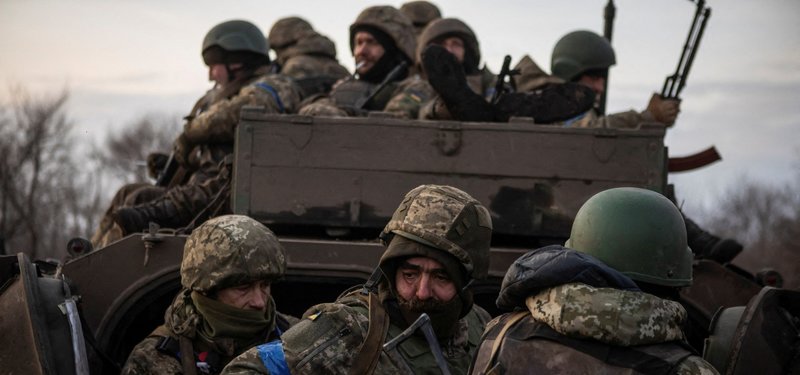
Russia says it is prepared for potential Ukraine Crimea offensive
"Everything is going according to plan," the Kremlin-appointed head of the region, Sergei Aksyonov, assured the state news agency Ria Novosti in an interview.
- World
- DPA
- Published Date: 08:41 | 10 March 2023
- Modified Date: 08:41 | 10 March 2023
Russia says it is ready for what it believes will be a Ukrainian advance on the Crimea peninsula, but military experts believe Moscow is running out of ammunition.
"Everything is going according to plan," the Kremlin-appointed head of the region, Sergei Aksyonov, assured the state news agency Ria Novosti in an interview.
Russia illegally annexed Crimea in 2014, before mounting its full-scale invasion of Ukraine last year.
Aksyonov said satellite images showed extended fortification lines on the isthmus to the peninsula and that trenches had already been dug on the beaches. Russian forces "are proceeding untypically, asymmetrically," he said, without elaborating.
His comments came as military experts said Russia is running out of missiles and its efforts to conquer Ukraine are likely to be seriously hampered by a lack of ammunition.
The assessment came from the British Defence Ministry's daily intelligence update on Friday.
The report said Russia now needs to accumulate a critical mass of newly manufactured missiles directly from industry before it has the means for a strike large enough to overwhelm Ukrainian air defences.
The ministry predicted that the frequency of Russian missile attacks on Ukraine is likely to decrease because of the missile problem.
The supply issue is also likely to affect Russian attempts to resume its military offensive, the Washington-based Institute for the Study of War wrote in a report published on Thursday.
It said Russian forces may be preparing to resume an offensive around the frontline town of Wuhledar in eastern Ukraine, as indicated by an exchange or relocation of troops in the Donbass region.
However an elite Russian unit of naval infantrymen suffered significant casualties when they attempted to take the Wuhledar area in a three-week offensive in February and the troops have been already re-formed at least seven times, the think tank wrote.
Ammunition is also an issue on the Ukrainian side.
The country needs two more months to build up reserves for its planned spring offensive, Mykhailo Podolyak, an adviser to the presidential office in Kiev, told the Italian newspaper La Stampa.
"We need to increase the supply of heavy artillery shells of 155 millimetre calibre and long-range missiles," he said.
Independent military experts had previously mentioned an earlier date for a possible counter-attack by Kiev.
Podolyak put the need for armoured vehicles to liberate more occupied territories at 400 to 500, a similar figure given in the past by Commander-in-Chief Valerii Zaluzhnyi. In addition, according to Podolyak, fighter planes are needed to intercept ballistic missiles and control the airspace.
He made no statement on the thrust of the planned counter-offensive, but said Russia has few options for its own offensive actions.
"Active enemy offensive actions will continue in the direction of Bakhmut, Wuhledar, Lyman and Soledar," Podolyak predicted.
The military news came as Finnish Prime Minister Sanna Marin visited the Ukrainian capital Kiev on Friday. She and Ukrainian President Volodymyr Zelensky attended a memorial service for a soldier killed in the still heavily contested eastern Ukrainian town of Bakhmut.
On Thursday Zelensky condemned the widespread Russian missile attacks on Ukraine's energy infrastructure and called for further actions against Russia in his nightly video address. He criticized the fact that a missile strike had once again temporarily cut off the power supply to the Russian-occupied nuclear power plant in Zaporizhzhya.
Russia could therefore no longer be a reliable partner in the nuclear sphere. "This means that the sooner Russia's nuclear industry is the target of sanctions, the safer the world will be. A terrorist state cannot be allowed to use nuclear facilities anywhere in the world for terror," Zelensky said.
Marin's visit comes as Finland and Sweden prepare to join NATO after decades of neutrality. The two applied for NATO membership in May but all 30 members of the defence alliance must agree to new members. Both Nordic nations are waiting for approval from Turkey and Hungary.
While Hungary is expected to say yes, Turkey has been reticent about allowing Sweden in because it accuses Stockholm of protecting what it calls Kurdish terrorists.
After a week-long break, negotiators for Turkey, Finland and Sweden met again on Thursday for talks in Brussels.

